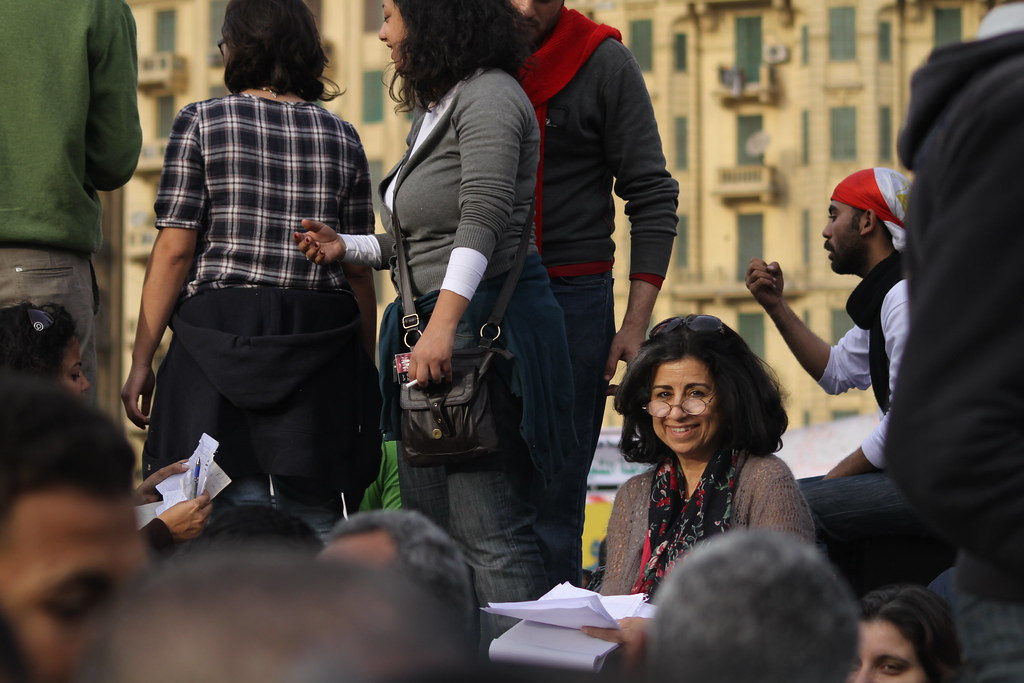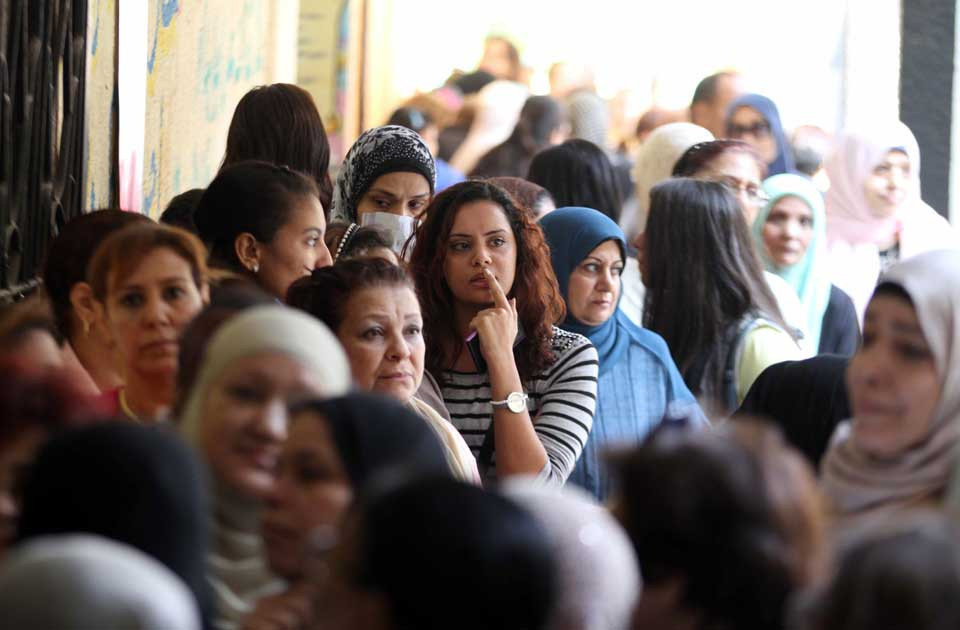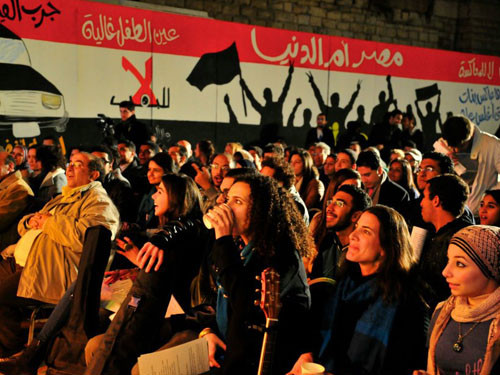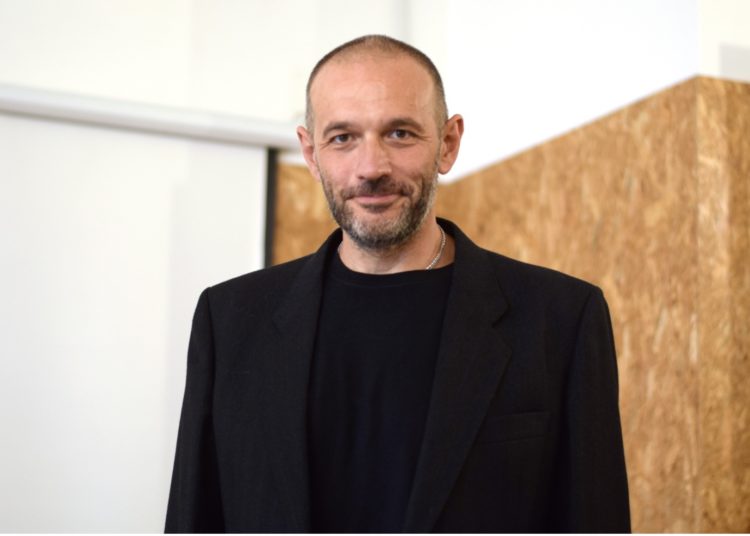This post is also available in: Français (French) العربية (Arabic)
The 2011 revolution was the main reason a large part of the youth became involved in the Egyptian public sphere, whose doors were suddenly opened to them as spaces of free and open discussions expanded. This would not have been possible had it not been for the massive public participation in the January 2011 protests. Of course, this did not last long, as is usually the case in Egypt. Every breakthrough is usually short-lived, and every opening is followed by a clamping down that is worse than before.
But the opening up of the public sphere after the revolution did not mean that everyone was welcome in it. Egyptian women were struggling to exact a space for themselves and fought bold battles so their voices could be heard, and they paid a heavy price for that. Many faced unprecedented sexual violations in the streets and public squares and suffered heavy emotional and material losses at the hands of all parties: those on the Right and those who raise the slogans of the Left, those who preach the principles of freedom and those who brag about their religiosity, those who associate themselves with the revolution and those crying over the defunct regime, the religious fascists and their military counterparts.
When we re-assess what happened in Egypt in the past 10 years, particularly the relationship between the revolution, the public sphere, and the feminist movement, it becomes evident that the revolution symbolized an exceptional chapter in the journey of feminist struggle in Egypt. According to some feminist historians and researchers, it led to the beginning of a fourth feminist wave in Egypt and the crystallization of its narrative, as the feminist movement centered its voice on sexual violence issues, the right to have bodily integrity, and the freedom to choose one’s sexual identity. These feminists adopted an intersectional feminist narrative that acknowledges the multiplicity and interrelatedness of sources of oppression against women and resists both the obvious and implicit patriarchy.
Hala Kamel, feminist researcher and member of the Women and Memory Forum, highlights two main issues that have taken center stage since the outbreak of the 2011 revolution in her study titled “A Brief Overview of the Demands of the Egyptian Feminist Movement Throughout its History”. These are sexual and physical violence, and the drafting of women’s rights into the new constitution. They have become directly associated with the January revolution.
Similarly, the organization Nazra for Feminist Studies, in a research paper titled “One Hundred Years of the Body’s Centrality in the Egyptian Feminist Movement,” argues that the feminist wave that followed the January revolution was characterized first and foremost by bodily rights and questions about the body. They also highlight that these issues were associated with the feminist struggle even before the revolution, as feminists were already tackling issues of female genital mutilation and sexual violence.
Nazra also concludes that the January revolution led to two key changes in the way issues of the body are dealt with. The first relates to how sexual violence is addressed, and the second is how other issues related to bodily and sexual rights are raised more daringly and openly than before, which has led to these generally becoming some of the most central questions and causes of the Egyptian feminist movement.
The relationship between the revolution and the feminist movement, the accompanying hope and disappointment felt deeply by the generation that joined the movement during the popular protests, the battles to create spaces, followed by the battle for steadfastness and endurance, fluctuating between highs and then lows, are all issues that that the girls and women of this generation have had to personally explore and articulate. Therefore, I am starting with this piece, which forms the first part in a series that aims to introduce the experiences of some Egyptian feminist activists who led the movement in the wake of the revolution and lived through a pivotal period in the history of Egypt in general and that of the feminist movement in particular.
This momentum that accompanied the revolution enabled us as feminists to depend on more revolutionary tools, starting with the streets after the grip of security agencies was weakened – we organized protests, marches, awareness-raising workshops, and educational seminars across Egypt. The open public sphere at the time also helped us conduct research and document and publish more rigorously and effectively via several mediums and with no restrictions. But everything has changed now; most of those tools are no longer available now that the public sphere is shrinking—or, to put it more precisely, now that it is completely closed off.
With those words, the Egyptian feminist activist Shayma’a Tantawy describes her observations of the feminist movement over the few years following the 2011 revolution, and the current reality considering the suffocation of civil society as a whole.

Shayma’a Tantawy is one of dozens of girls who got involved in the Egyptian feminist movement in the aftermath of the January 25 revolution. She came to Cairo from her hometown of Minya in Upper Egypt, with a determination to become independent from her family and settle in the capital, Cairo.
Tantawy decided to become part of the feminist movement by working through institutions like Nazra for Feminist Studies and the Center for Egyptian Women’s Legal Assistance (CEWLA), and by volunteering in feminist initiatives and groupings like Barah Aamen, which she co-founded to oppose violence against women in the private sphere by documenting incidents of domestic violence and pushing for legislation that criminalizes it.
Tantawy underlines that advocacy and pressure via the digital space, specifically social media platforms, are the tools that are currently available to the feminist movement in Egypt. Despite these tools achieving some positive impact, in terms of mobilizing support for a specific issue or exposing sexual predators or offenders, or even to repeal/amend/issue [new] legislation, their impact nonetheless remains limited, according to Tantawy. She attributes that to the nature of digital campaigns, which grow quickly but then contract just as rapidly.
Feminist activism becoming limited to the digital space that Tantawy is referring to is one of the outcomes of the increased targeting of civil society organizations and those who work for them by the authorities, and the continuous persecution of human rights defenders since 2016, when case number 173 of year 2011, known as “The Case of Foreign Funding of Civil Society Organizations, was re-opened. The case lists dozens of organizations and accuses them of violating the law by receiving foreign funding, evading taxes and operating without obtaining the required licenses. In the context of this case, judicial decisions – that are still effective – were issued to seize the funds of many of those organizations, and impose a travel ban on many of their staff members.
This environment pushed many feminist groups that were formed after the revolution to freeze their activities, and many of the founders of those groups ended up leaving the country.
Tantawy finds that the departure of those groups from the scene negatively impacted the feminist movement, reducing its ability to influence and taking away one of its most important post-revolution features: the liberation from centralization in Cairo, where all activity, action and attention had previously been centered.
“The feminist movements that were established after the revolution in the cities and villages that are far away from Cairo, were not able to survive in the face of the crackdown and [growing] restrictions, as well as the return of the grip of security [forces],” said Tantawy. “They were the first to suspend their activities out of fear of the repercussions of actions on the ground, and with the collapse of those groups, the movement significantly shifted back to the center.”
In 2013, Tantawy joined Nazra for Feminist Studies, one of the organizations listed in the “Case of Foreign Funding”. She was there when a judicial decision added that organization to the case, which was accompanied by a travel ban imposed on the head of the organization, Muzn Hassan, and the freezing of her bank accounts, as well as the seizure of the organization’s funds.
“It was a very difficult moment; I did not understand the reason behind this decision, as I was convinced that this organization was working in the interest of the country and Egyptian women, and we were working sincerely in the pursuit of justice,” said Tantawy.
“Of course, I did realize the gravity of the situation, but I chose to continue my work with the organization. I developed an awareness in that [work] place, and during my time there and because of it I know who I am and what I want, therefore I did not think of abandoning it, but I wanted to do all I can so that it can continue its activities, even if it was the bare minimum.”
Tantawy continued working with Nazra for a few years following this incident. She recently joined the Center for Egyptian Women’s Legal Assistance (CEWLA), which is also one of the organizations listed and accused in the case of foreign funding. CEWLA had a judicial decision issued against it in 2016 too, which allowed the state to seize its funds, freeze bank accounts and impose a travel ban on the head of the center, lawyer Azza Suleiman.
“I think that the covert patriarchy that had imposed its hegemony over the Egyptian feminist movement for a long time is significantly receding as a result of our fight, I mean the feminists whose awareness was formed in the wake of the revolution”
At the same time, Tantawy has undertaken the management of the feminist group Barah Aamen, which she is trying hard to keep going despite the successive collapse of independent groups and initiatives in Egypt.
“I know that the risks are serious, coming at us from every corner, but I do not want to leave the circle of feminist activism. I deeply believe in the values of feminism and justice, and my goal is to spread awareness amongst women about their rights and contribute to ending violence against them,” said Tantawy.
“I know that I will pay the price of those difficult choices, but I believe that my decision to be part of civil society is less difficult and costly than other choices in my life, which are made all the more difficult and costly just because I am a woman living in Egypt.”
But despite the restrictions the Egyptian feminist movement suffer from, Tantawy sees there has been a lasting impact to the changes that imposed themselves on the movement thanks to the revolution, resulting in great progress and development if not a complete shift inside the movement, most notably in the feminist narrative that has now taken a more intersectional approach after years of most feminist circles being stuck between a dichotomy of Leftist and Liberal approaches.
Tantawy attributes this change to the fact that many feminist defenders who joined the movement after the revolution of 2011, herself included, did not grow up in the capital of Cairo or in liberal environments, or did not come from progressive families as is the case with former generations of Egyptian feminists, but rather grew up in marginalized cities and villages, in conservative working-class families.
“When the revolution erupted and we took to the streets seeking freedom and salvation from violence lurking in homes, we discovered that violence existed in the streets too, especially when we found ourselves a target of sexual terrorism in the squares during protests,” said Tantawy. “This made us realize that the personal is also political, and that authoritarianism and violence in the personal domain is intertwined with discrimination and violence in the public domain, and this cast its shadow on the movement’s rhetoric, making it more holistic and inclusive, and more daring than ever.”
In addition, Tantawy asserts that the Egyptian feminist movement achieved a real victory despite the dismal situation it is going through, which is represented in breaking the silence with unprecedented courage in uncovering crimes of sexual violence in both the private and public domains and exposing perpetrators. This has impressively led to pushing the boundaries of discussion on sexual violence and what it means, in parallel with forming far reaching solidarity that transcends the physical obstacles imposed on women in Egypt.

A wide feminist uprising against sexual violence in Egypt began in July 2020 via social media, after several female survivors published their own personal accounts of sexual assault (rape, rape attempt, sexual black mail, and sexual harassment), committed against them by a former student of the American University in Cairo.
The stories of those survivors led many other women to recall details of similar assaults that they had to stay silent about out of fear of retribution and the associated social stigma. They decided to share their painful stories using hashtags like #Expose_Harrasers, #The_Start_Of_A_Feminist_Revolution, #We_Believe_Survivors, #The_First_Time_I_Was_Harassed_Was, and #Rape_Is_A_Crime (translated from Arabic).
The wave of testimonies shattered many taboos, and called out dozens of public figures in different fields, and until this day this movement has not subsided. The wave of women’s testimonies about sexual violence challenged perpetrators who had thought their crimes would remain a secret. Not all testimonies caused a stir, but the movement that was described as being the Egyptian #MeToo is no doubt an extension of what was started 10 years ago, when women and girls stood up to the sexual terrorism targeting them in the street, thereby challenging the authorities who turned a deaf ear to such incidents and society’s attacks on them.
In the context of positive impact, Tantawy notes the other change witnessed by the Egyptian feminist movement, which she personally believes was triggered by the January 25 revolution: the receding of disguised patriarchy.
“We lived through internal battles to liberate ourselves from the hidden patriarchy, which were caused by the problems of institutionalization and organization that the Egyptian feminist movement centered on since the late nineteenth century until 2011, in addition to the desire of former generations to lead the movement,” said Tantawy.
“But the state of rebellion and unbridled anger that loomed over everything at the time led to clashes between the older generations and the new generation that had just joined the movement.”
Tantawy concludes by saying: “I think that the disguised patriarchy that had long reigned over the Egyptian feminist movement has clearly begun receding, because we fought for that, I mean the feminists whose awareness began crystalizing in conjunction with the revolution and what came after. We are a generation that faced death and is constantly being targeted, so we do not fear anything and our voices will continue to be loud and our minds free, and we will fight patriarchy in all its forms.”































